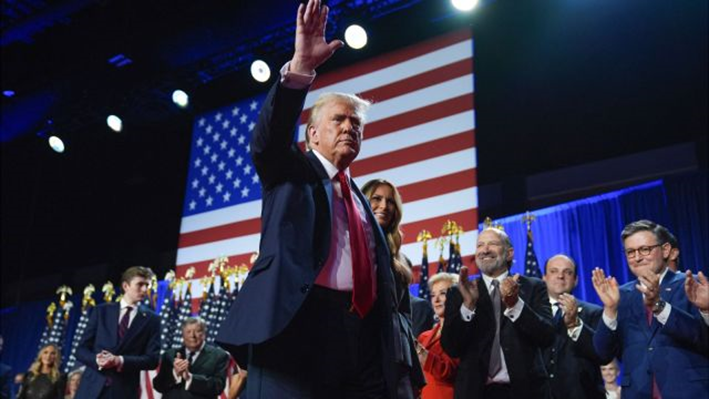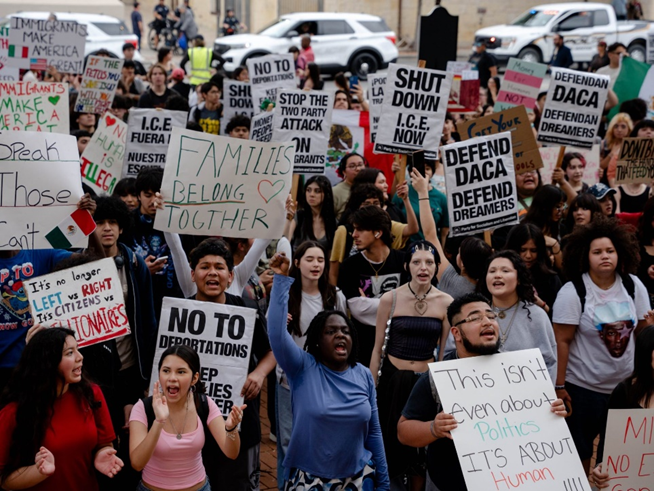Locked Out: The Ripple Effects of Trump’s Immigration Policies on Foreign Students and U.S. Schools
Input
Modified
Consequences of Trump’s Immigration Policies Economic Consequences of Reduced International Student Enrollment Institutional Responses and Direct Effects on Foreign Students

Consequences of Trump’s Immigration Policies
The American educational system has been impacted by the Trump administration's most recent immigration policies, which have established a climate of dread and uncertainty. This has been observed in both K-12 schools and higher education institutions. The revocation of the U.S. Immigration and Customs Enforcement (ICE) policy, which designated schools, hospitals, and places of worship as "sensitive locations" where enforcement actions were generally avoided, has been one of the most alarming changes. This policy change has had significant repercussions, particularly for pupils from mixed-status and undocumented families.
School districts in cities such as Denver have observed a significant rise in absenteeism, particularly in the wake of ICE operations in adjacent communities. Superintendent Alex Marrero has publicly stated that pupils are absent from school due to concerns that their parents or guardians may be detained while they are away. Denver and other school districts, including those in South Florida and Cincinnati, have taken legal action against the federal government in response, contending that these policies foster an environment of instability that impedes the educational process.
The psychological impact of these policies on students has been a source of concern for educators and administrators across the country. The fear of deportation and family separation has been associated with heightened stress levels, anxiety, and decreased academic performance in students who are affected. Some educators have even reported instances in which students intentionally avoid extracurricular activities or withdraw out of school in order to reduce their exposure to potential ICE enforcement.
Institutions of higher education are confronted with comparable obstacles. College administrators have been compelled to negotiate an increasingly intricate array of immigration regulations, which has resulted in disruptions for both students and faculty members. International students, who previously perceived the United States as the preeminent destination for higher education, are now reevaluating their decisions as a result of the hostile immigration climate. Prospective students from countries such as China, India, and Brazil are now choosing Canada, the United Kingdom, and Australia due to the perception that their immigration policies are more hospitable, according to reports.

Economic Consequences of Reduced International Student Enrollment
Throughout history, the United States has been the primary destination for international students, with over one million foreign students enrolling in American universities annually. These students make substantial contributions to the economy by means of tuition payments and local expenditures on housing, food, and other services. Conversely, the enrollment of international students has experienced a consistent decline during the Trump administration, primarily as a result of the administration's perceived anti-immigrant posture and restrictive visa policies.
The Deferred Action for Childhood Arrivals (DACA) program's revocation and the stricter visa restrictions that have been implemented have imposed additional obstacles for international students. Many students have reported experiencing delays in visa approvals, challenges in renewing their student visas, and even explicit denials for seemingly arbitrary reasons. Academic endeavors have been disrupted, and prospective applicants have been discouraged from selecting U.S. institutions as a result of these delays.
This decline has a substantial economic impact. International students generate hundreds of thousands of employment opportunities and contribute nearly $40 billion annually to the U.S. economy, as per the National Association of Foreign Student Advisers (NAFSA). Universities and colleges that depend significantly on tuition from international students are experiencing financial shortfalls due to a decrease in student enrollment. Public universities are currently facing budgetary constraints that may result in increased tuition rates for domestic students or reductions to academic programs. These institutions frequently rely on tuition from international students to subsidize in-state students.
Moreover, the cultural diversity that has long been a defining characteristic of American higher education is diminished by the departure of international students. In an era of globalization, it is essential to have access to a variety of perspectives, and a student body that is less diverse can limit this. Universities are not only educational institutions, but also centers of international collaboration, research, and innovation. The United States is at risk of losing its competitive advantage in scientific and technological advancements by discouraging foreign students from enrolling.

https://sanantonioreport.org/san-antonio-high-school-students-walk-out-to-protest-ice-raids/
Institutional Responses and Direct Effects on Foreign Students
The impact of the Trump administration's immigration policies on foreign students is not limited to enrollment figures. Numerous students who had already initiated their academic pursuits in the United States encountered an environment that was becoming increasingly antagonistic. Their academic progress has been impeded by visa restrictions and policy changes, which have impeded their ability to concentrate on their studies while navigating bureaucratic obstacles.
The H-1B visa process and programs such as Optional Practical Training (OPT) have become increasingly challenging to obtain work authorization. This has been a significant issue. Numerous international students depend on these programs to acquire vital work experience in the United States following their graduation. Nevertheless, the employment prospects of students are dubious due to the delays and denials that have resulted from the implementation of more stringent immigration policies. Despite receiving employment offers from American companies, some individuals have been compelled to return to their home countries earlier than anticipated.
Furthermore, the mental health of international students has been impacted by the climate of anxiety that these policies have fostered. Many individuals report experiencing increased anxiety as a result of uncertainties regarding their long-term residency in the United States, the revocation of their visa status, and the possibility of deportation. Universities have responded by expanding counseling services and providing legal assistance; however, these measures have failed to alleviate the pervasive distress experienced by students.
Some higher education institutions have implemented proactive measures to provide assistance to their international students in response. Several universities have established dedicated offices for international student advocacy, established emergency legal funds, and engaged in legal conflicts against restrictive immigration policies. In response to federal immigration enforcement actions, sanctuary campuses have emerged as a form of resistance, with certain institutions publicly pledging to safeguard students.
Many foreign pupils in the United States continue to face an uncertain future, despite these endeavors. Many prospective students have already begun to consider alternative destinations for their studies due to the reputational harm caused by these policies. The United States is at risk of losing its status as the premier global education center if the current trend persists, which would further erode its economic and cultural influence in the academic sector.
The immigration policies of the Trump administration have had a significant impact on the educational landscape in the United States and on foreign students. These policies have disrupted the lives of countless students and placed educational institutions in a challenging position by fostering an environment of dread and uncertainty. Economic risks and the cultural diversity that has long been an asset of American higher education are at risk due to the decrease in international student enrollment. Despite the fact that schools and universities have implemented measures to mitigate these policies, the long-term consequences remain uncertain. The hope is that future policies will prioritize education and the invaluable contributions of international students, rather than erecting barriers to learning and development, as the legal battles unfold.





















